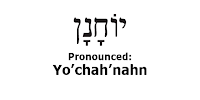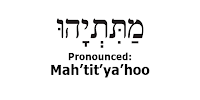Daniel
(Are you looking for our Twebrew School Treats about the Hebrew alphabet or our Hebrew Instructional videos? Click here for a directory!)

Click here to hear Dah'nee'el pronounced
Daniel, whose name means “Justice from God,” served in the court of the Babylonian King Nebuchadnezzar II, where he glorified the name of God and strengthened the faith of his fellow Jews. Although the last chapters of the Book of Daniel are visionary, Daniel himself is not counted among the prophets, and the Book of Daniel is categorized among the “Writings.”
The Book of Daniel introduces Daniel thus:
In the third year of the reign of Jehoiakim king of Judah, came Nebuchadnezzar king of Babylon unto Jerusalem, and besieged it. And the Lord gave Jehoiakim king of Judah into his hand, with part of the vessels of the house of God; and he carried them into the land of Shinar to the house of his god, and the vessels he brought into the treasure-house of his god (Daniel 1:1-2). Nebuchadnezzar instructed his chief officer to select several handsome and intelligent Jewish youth of royal blood to be brought to the Babylonian court and taught the language of the Chaldeans (Babylonians). These youths were also given new names: Daniel became Belteshazzar, Hananiah became Shadrach, Mishael became Meshach, and Azariah became Abed-nego (Daniel 1:3-7).
Daniel’s life at court was anything but mundane. He first came to the notice of the king after the king ordered the death of all the wise men of Babylon for failing to interpret his dream. Daniel was brave enough to interpret a dream, after which the king told Daniel “...your God is the God of gods, and the Lord of kings, and a Revealer of secrets, since you have been able to reveal this secret. Then the king made Daniel great...” (Daniel 2:47-48).
Daniel’s role in the court continued into the next generation. In his most famous interaction with Nebuchadnezzar’s heir, Belshazzar, he predicted the destruction of the Babylonian kingdom when mysterious writing appeared on the wall of the palace. Belshazzar died and the Babylonian empire was taken over by Darius the Mede, who trusted Daniel implicitly but was trapped by his officers into throwing Daniel into the lions’ den. (Fortunately, Daniel survived.)
Copyright © 2011 National Jewish Outreach Program. All rights reserved.

Click here to hear Dah'nee'el pronounced
Daniel, whose name means “Justice from God,” served in the court of the Babylonian King Nebuchadnezzar II, where he glorified the name of God and strengthened the faith of his fellow Jews. Although the last chapters of the Book of Daniel are visionary, Daniel himself is not counted among the prophets, and the Book of Daniel is categorized among the “Writings.”
The Book of Daniel introduces Daniel thus:
In the third year of the reign of Jehoiakim king of Judah, came Nebuchadnezzar king of Babylon unto Jerusalem, and besieged it. And the Lord gave Jehoiakim king of Judah into his hand, with part of the vessels of the house of God; and he carried them into the land of Shinar to the house of his god, and the vessels he brought into the treasure-house of his god (Daniel 1:1-2). Nebuchadnezzar instructed his chief officer to select several handsome and intelligent Jewish youth of royal blood to be brought to the Babylonian court and taught the language of the Chaldeans (Babylonians). These youths were also given new names: Daniel became Belteshazzar, Hananiah became Shadrach, Mishael became Meshach, and Azariah became Abed-nego (Daniel 1:3-7).
Daniel’s life at court was anything but mundane. He first came to the notice of the king after the king ordered the death of all the wise men of Babylon for failing to interpret his dream. Daniel was brave enough to interpret a dream, after which the king told Daniel “...your God is the God of gods, and the Lord of kings, and a Revealer of secrets, since you have been able to reveal this secret. Then the king made Daniel great...” (Daniel 2:47-48).
Daniel’s role in the court continued into the next generation. In his most famous interaction with Nebuchadnezzar’s heir, Belshazzar, he predicted the destruction of the Babylonian kingdom when mysterious writing appeared on the wall of the palace. Belshazzar died and the Babylonian empire was taken over by Darius the Mede, who trusted Daniel implicitly but was trapped by his officers into throwing Daniel into the lions’ den. (Fortunately, Daniel survived.)
Copyright © 2011 National Jewish Outreach Program. All rights reserved.


Comments
Post a Comment